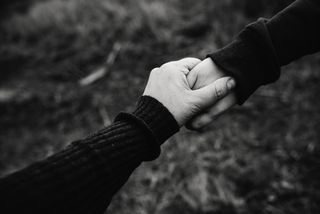Altruism
Are We Biologically Wired to Help Others During Crisis?
Research helps explain the biological basis of altruism.
Posted April 17, 2018

Interpersonal connections reveal our humanity, especially in times of crisis. For every headline about a national disaster or other tragedy there are accompanying stories about the communities that mobilize to support those affected. After the devastating hurricanes of 2017 that ripped through several regions, including my home state of Texas, stories emerged of neighbors and strangers using rafts to rescue stranded individuals and families. People from far away organized drives and fundraised to collect money and supplies for those in need. Posts throughout social media responded to pleas for help and offered words of support.
I live in Austin, Texas and was gripped, along with the rest of the city, by the recent bombing attacks. A bomb exploded in my friend’s neighborhood and bombs were found in businesses that I had visited. These events were happening in my backyard and I experienced firsthand how communities mobilize when tragedy strikes. The city’s collective fear was palpable. One way that I coped was to reach out to others who were being affected by the events. In fact, the entire Austin community, while struggling to understand how we could feel safe enough to move through everyday life, leaned on each other for support. We connected across neighborhoods, through friends and online.
School shootings, natural disasters, stories of individuals coping with devastating medical diagnosis. These events often compel us to take notice and act in response. Interestingly, not only does taking action feel right, but studies have shown that specific areas of our brain activate when we behave altruistically. In a 2006 study, researchers showed using functional magnetic resonance imaging (fMRI) that the mesolimbic system, an area of the brain that mediates the reward response, was activated when participants donated to causes they cared about. The authors of the study also found that a similar response is observed when people receive monetary rewards. Our strong desire to reach out to those affected by tragedy is rooted in biology with brains “programmed” to give.
The authors of a 2012 study described the protective factor of community support on well-being in groups affected by tragedy. The study analyzed three groups who experienced separate tragic incidents: a mall shooting and two school shootings. This collective support had protective effects on individuals’ well-being. These individuals were shown to have less depression several months after the tragic events.
Biology aside, there are many practical benefits for communities that unite during a crisis.
Empowering in vulnerability
Tragic events are an unfortunate part of daily life that can trigger our own vulnerabilities. Direct victims, aside from the impact of the tragedy itself, are confronted with loss of control and a sense of powerlessness. As witnesses to such events, we can empathize with those affected and imagine how we might cope in similar situations. Tragedies can occur in all aspects of our lives. With the recent increase in school shootings, students and their families might feel more fearful and anxious about the potential dangers in an environment that is typically a safe space for kids to grow and learn. Natural disasters reveal the unpredictability and impulsiveness of the weather.
Reaching out to others who are affected, whether it be with encouraging words, physical help or financial support, can give us an opportunity to reestablish feelings of power and control. Similarly, when we are witnesses to tragedy in communities around us, we can feel empowered by reaching out to support those directly affected. We connect with other people who we see suffering with an understanding that at another point in time, we could be the ones confronting a tragedy or crisis.
Suffering together
Engaging with one another during times of crisis protects us from isolation and the belief that no one understands our pain. In fact, people do better physically, emotionally, and psychologically when they connect with others during times of suffering. As the authors of the 2012 study showed, connecting during crisis can be protective. Humans are social beings, designed to live cooperatively. This is a practical way to collect and share resources, as well as being important to our physical and emotional wellbeing.
Give meaning to experience
Natural disasters and other tragedies are often random and can feel evil and sinister. In our search for finding peace, connecting with others can help us derive some meaning from what occurred. The students and families who experienced the Stoneman Douglas High School shooting in Parkland, Florida used this tragedy to galvanize a country into action in the gun control debate. While the tragedies are never justified, there is space for finding purpose in the positive change that can occur in their aftermath.
Something to Consider
While tragedies are devastating to those who are directly affected as well as those who are a witness to the events, the social and empathic nature of our humanity manifests during these times. Crisis can instill fear and isolation, but community resilience flourishes as we connect with others.
References
Moll, J., Krueger, F., Zahn, R., Pardini, M., de Oliveira-Souza, R., and Grafman, J. (2006). Human fronto–mesolimbic networks guide decisions about charitable donation. Proceedings of the National Academy of Sciences of the United States of American.
Hawdon, J., Rasanen, P., Oksanen, A., Ryan, J., Social Solidarity and Wellbeing After Critical Incident: Three Cases of Mass SHooting. (2012). Journal of Critical Incident Analysis.


